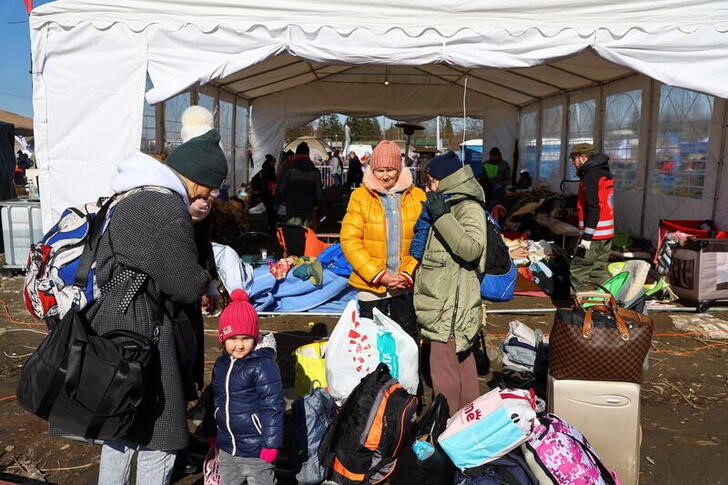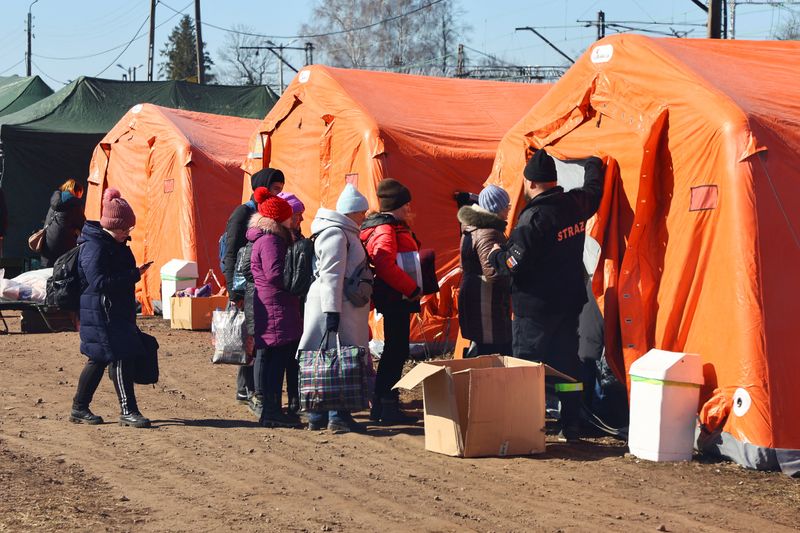
The mayors of Poland's two major cities issued a warning about the number of refugees arriving from Ukraine, who are overwhelming the capacity of their cities as the conflict in the neighbouring country intensifies.
According to the UN, more than 1.7 million people have crossed Poland since the Russian invasion began, some 300,000 of them, according to Rafal Trzaskowski, Mayor of Warsaw, have arrived in the Polish capital, a major challenge for the authorities who nevertheless reiterated their commitment to continue supporting Ukrainian refugees.
“Our city remains the main destination for Ukrainian refugees. The situation is getting harder and harder every day,” Trzaskowski said on Twitter recently.
The refugee situation is even more serious as data from the UN Human Rights Council show that since February 24, when Russian troops entered Ukrainian territory, more than 2.8 million people have fled the invaded country and more than half of that grand total would be in Poland today.

Refugees arriving in the Polish capital are mainly accommodated in private residences, as well as in two large sports stadiums. Signs are now being posted at Warsaw's central train stations to direct people to other parts of Poland where there is more space to accommodate and serve them. “The big cities in Poland are already overcrowded,” says a poster, “don't be afraid to go to the smaller towns: they are peaceful, have food, infrastructure and are well adapted.”
“I have the feeling that Warsaw is full and I hear it from many people. The reception points in Warsaw are also crowded,” Marianna Ossolińska, coordinator of the Club of Catholic Intelligentsia, which works with refugees in Poland, told The Guardian.
Ossolińska is running its hostel, which offers 70 beds and has been full since shortly after opening on March 2. “A lot of refugees try to come to Warsaw, probably because they think it will be easier to find transport to Western Europe from a capital city, or to find jobs or make connections,” he explained.
Ossolińska said that many people who worked in the field were now struggling to find places to accommodate everyone. “Day by day, it's much harder to find a private place for refugees.”
For its part, in Krakow, the number of refugees is exceeding 100,000 people in just a few weeks, something that worries its mayor Jacek Majchrowski, who said that the city “is slowly losing the opportunity to accommodate new waves of refugees.”
Majchrowski is taking measures similar to those in Warsaw, trying to encourage new refugees to reach nearby towns and places outside the city to prevent the collapse of Krakow.
On some public transport in the city, ads are already shown in Ukrainian and Polish to help inform the thousands of newcomers.
In the city's main train station there are two large tents serving hot food and offering advice to refugees. Indoors, people sleep on folding mats, waiting for trains or considering what to do next.
“I heard that Krakow has taken 100,000 people,” said Jacek, a local volunteer who helps the Guardian at the station, “and we are just a city of 800,000.” He added that he had recently helped a mother who had arrived from Lviv with her children and had nowhere to sleep. “I called my wife and told her I would take them home with me.”

One organization, Fundacja Brata Alberta, tweeted about the “tragic” situation at the Krakow railway station: “There is nowhere to direct refugees, they are stressed and confused, all the help is needed and, above all, local. We call a lot of places, but the only answer is: there are no more beds.”
“Everyone wants to stay in Krakow,” said another volunteer at the Krakow railway station as she ran among groups of people asking for advice, “but there is no room anymore.”
The Ukrainian flag is visible in almost every other shop and cafe shop window and the sense of solidarity on the streets of Poland's second largest city remains strong, even as the city seems to be reaching its limit for newcomers.
“The citizens of Ukraine have been working with us since the very existence of our restaurant,” says a sign on the window of a cafe in the historic old town, “we are in this together.”
KEEP READING
Últimas Noticias
Debanhi Escobar: they secured the motel where she was found lifeless in a cistern

The oldest person in the world died at the age of 119

Macabre find in CDMX: they left a body bagged and tied in a taxi
The eagles of America will face Manchester City in a duel of legends. Here are the details

Why is it good to bring dogs out to know the world when they are puppies




